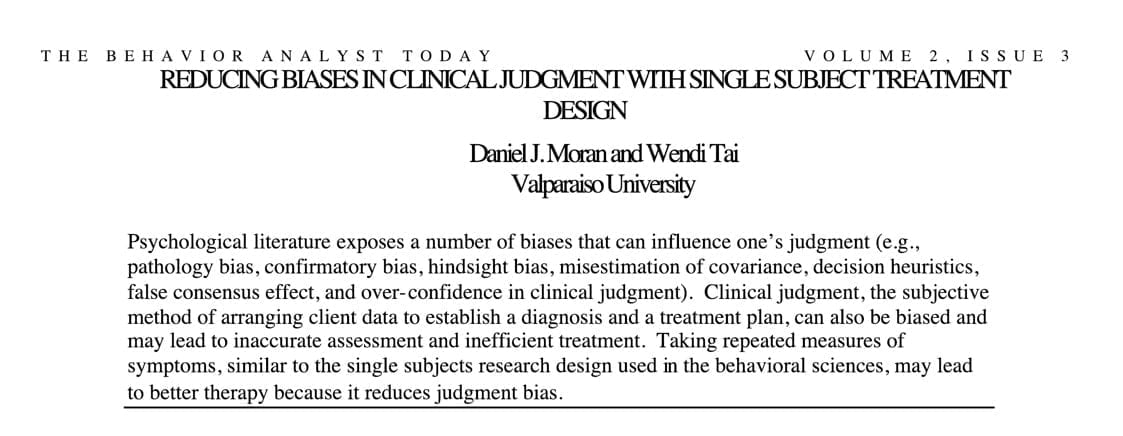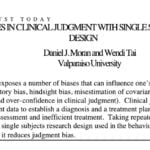Reducing Biases in Clinical Judgment with Single-Subject Treatment Design
$10.00
BCBA CEUs: 1 CEU
Read the following article and pass a 12-question quiz on it:
Moran, D. J., & Tai, W. (2001). Reducing biases in clinical judgment with single-subject treatment design. The Behavior Analyst Today, 2(3), 196-203.
Brand: CEUniverse
Description
To earn credit, you will be required to read the article and pass a 12-question quiz about it. You can retake the quiz as many times as needed, but you will not receive exactly the same questions each time.
Abstract
Psychological literature exposes a number of biases that can influence one’s judgment (e.g., pathology bias, confirmatory bias, hindsight bias, misestimation of covariance, decision heuristics, false consensus effect, and over-confidence in clinical judgment). Clinical judgment, the subjective method of arranging client data to establish a diagnosis and a treatment plan, can also be biased and may lead to inaccurate assessment and inefficient treatment. Taking repeated measures of symptoms, similar to the single subjects research design used in the behavioral sciences, may lead to better therapy because it reduces judgment bias.
13 reviews for Reducing Biases in Clinical Judgment with Single-Subject Treatment Design
Sorry, no reviews match your current selections





Interesting article on how these biases can result in prejudgments and rash decision-making by clinicians.
Great information!
I really don’t like how a singular error causes your score to be reduced by 2 points. During most quizes it doesn’t make a difference because you have to retake the quiz even if you get one wrong, but getting your score reduced by ‘2’ when you only got 1 question incorrect. What it “appears” to be doing is reducing the score by ‘1’ for selecting the incorrect answer and additionally reducing your score by ‘1’ for not selecting the correct answer. Might just be a technology adjustment?
That is not how our quiz scoring works. Some questions, however, have multiple correct answers (“check all that apply” type questions) and are worth multiple points. Thus, on those questions you can have your score reduced by 2 or more points if you do not select 2 or more of the possible correct answers (i.e., your score is not reduced by multiple points for making a “singular error” — it is reduced by multiple points for making multiple errors). If you believe a quiz is being scored incorrectly, please contact our helpdesk with a description and evidence of your claim.
Good article with realistic examples.
good article!